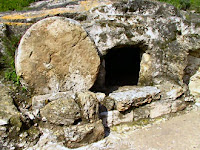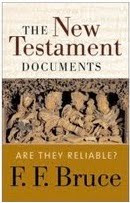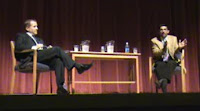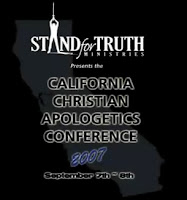 Resurrection debate between William Lane Craig and Bart Ehrman on MP3. Enjoy
Resurrection debate between William Lane Craig and Bart Ehrman on MP3. EnjoyFeedback on the debate?
 The Resurrection Debate 2004: Michael Licona vs. Richard Carrier. Provided on MP3. Enjoy!
The Resurrection Debate 2004: Michael Licona vs. Richard Carrier. Provided on MP3. Enjoy! by Brian Auten
by Brian AutenThe Ultimate Question
Does God exist? This is arguably the most important question that one will ever ask. The answer to this question will change how one views reality, morality, ethics, values, and life’s decisions. The existence of God determines how one sees life and interprets reality. The answer has eternal ramifications. American philosopher and author Mortimer Adler said, “More consequences for thought and action follow the affirmation or denial of God than from answering any other basic question.”[1]
For these same reasons, some would avoid the question altogether. However, it would seem wise for the uncertain or skeptical person to invest themselves seriously in finding the answer. As Blaise Pascal, the French philosopher, mathematician and physicist, wrote, “…there are only two classes of persons who can be called reasonable: those who serve God with all their heart because they know him, and those who seek him with all their heart because they do not know him.”[2]
Proof and Evidence
God cannot be proven to exist in the same way one could prove the existence of an automobile or a teapot. By his very nature, God is not substantive, tangible or physically observable. So when one asks for physical proof for the existence of God, it could be compared to asking for physical proof for a mind. In that case, absolute proof is unreasonable, but the belief is rational because the evidence is abundant. Moreover, alternative explanations for the evidence of a mind would seem absurd when compared with the simple conclusion that a mind exists.
Sufficient Reason
German philosopher and mathematician Gottfried Leibniz asked the question, “Why is there something rather than nothing?” Why does anything at all exist? There must be an answer to this question because, “nothing happens without a sufficient reason.”[5] He pointed out that for everything there must be a sufficient reason.
English theologian and philosopher William Paley asserted that every watch requires a watchmaker.[7] He describes how someone would respond who, having never seen a watch before, happened to discover one in nature. That person would observe the watch’s intricacy, precision, complexity, and apparent purpose. He would by no means assume the watch “just happened.” Rather, he would rightly infer a watchmaker from the observable evidence of design in the watch. The watch requires a watchmaker. Paley then goes on to describe that creation itself points to a Creator.
Consider the order and complexity contained in DNA, the nucleic acid that contains the genetic instructions used in the development and functioning of all living organisms. As leading atheistic evolutionist Richard Dawkins admits, “There is enough information capacity in a single human cell to store the Encyclopedia Britannica, all 30 volumes of it, three or four times over.”[8] This set of instructions is extremely complex, intricate, and orderly. It is considered the blueprint for all living things. It contains the design and operating instructions for life. Human DNA contains billions of “letters,” all in a specific order, all for a specific purpose. The inference of a designer from such a combination of order, information, and design is profoundly amplified when one considers the myriad forms of life on the planet.
Aside from the apparent design of life, consider the order and fine-tuning of the universe itself. There are certain specific, necessary conditions that must be in place for life to exist on earth. These constants include such things as oxygen level, atmospheric transparency, moon-earth gravitational interaction, carbon dioxide level, and gravity. If any one of these constants were adjusted even by the smallest fraction of a percent, it would render life on earth impossible.[9] Astrophysicist Hugh Ross has revealed over 122 of these constants.[10] Theoretical physicist Paul Davies said:
It is hard to resist the impression that the present structure of the universe, apparently so sensitive to minor alterations in the numbers, has been rather carefully thought out . . . the seemingly miraculous concurrence of [these] numerical values must remain the most compelling evidence for cosmic design.[11]
When one looks at the order, information, and design in nature and the cosmos, there are two options: it came about by random chance without reason, or it was created by an intelligent designer. The evidence seems to cry out for a designer.
The Beginning of the Universe
Modern cosmology has shattered the old idea that the universe is eternal; that is, that the universe had no beginning. Science has shown that the universe has not been around forever—space, time and everything that exists had a definite beginning. This can be demonstrated by such things as the second law of thermodynamics, the expansion of the universe, and cosmic background radiation.[12] Commenting on the evidence for a definitive beginning of the universe, physicist and cosmologist Robert Jastrow states:
Now we see how the astronomical evidence leads to a biblical view of the origin of the world. The details differ, but the essential elements in the astronomical and biblical accounts of Genesis are the same: the chain of events leading to man commenced suddenly and sharply at a definite moment in time, in a flash of light and energy.[13]
This leads a very powerful argument for the existence of God called the kalam cosmological argument. The argument is as follows: 1) whatever began to exist must have a cause, 2) the universe began to exist, 3) therefore, the universe had a cause.[14] This argument is based upon the law of causality and the scientific evidence of the beginning of the universe. Because every event has a cause, the beginning of the universe requires a cause. The beginning could not be from nothing, because nothing comes from nothing. Something cannot bring itself into existence. There must be a higher, external, cause beyond the universe. By nature, God is eternal and uncaused; he is the cause that the universe requires to reconcile the evidence of a beginning.
St. Thomas Aquinas, the most famous medieval philosopher-theologian, made a similar argument from the principle of causality. Based on the principle of motion, Aquinas argued that there must be an “unmoved mover,” or a first cause of all motion, and this is God. For example, a watch could not run without a spring even if it had an infinite number of gears; a train could not move without an engine even if it had an infinite number of cars.[15] Since something cannot cause itself, Aquinas points to God as the First Cause and the Unmoved Mover of all things.
The existence of God makes sense of universal truths. If something is true, it is true for all people, in all places, at all times. Truth is not dependent upon someone’s knowledge of it. Truth corresponds with reality.[17] A couple of examples are mathematics and the laws of logic. No one invented mathematics or logic. They exist independently and correspond with reality. They are universal, unseen, and true.
Every person has a moral compass that they live by. This is commonly known as the conscience. The word conscience means “with knowledge.” This has also been called the moral law. One who would deny the existence of the moral law would soon admit differently if he himself were the recipient of a morally wrong action. Norman Geisler put it rightly: “the moral law is not always the standard by which we treat others, but it is nearly always the standard by which we expect others to treat us. It does not describe how we actually behave, but rather it prescribes how we ought to behave.”[18]
There are two options. God exists, or God does not exist. A non-theistic worldview is severely lacking in its account for the existence of the universe, the beginning of the universe, and the design of the universe. Here, the atheistic worldview relies on long periods of time and random chance to produce something from nothing, order from chaos, life from non-life, and intelligent minds from mere matter. The atheist worldview has no ultimate foundation for morality. Atheism leaves man hopeless, helpless, and meaningless. If atheism is true, then man has no inherent dignity or purpose. All is random, temporal, and empty.
Conclusion
Absolute proof is not required to believe in God. A rational person can have a reasonable faith that is based upon good evidence. However, many reject God not for intellectual reasons, but for emotional reasons. The implications of God’s existence seem too uncomfortable for some; He is ignored, excused, and denied. Someone who has chosen not to believe in God can refuse to be convinced, even in the face of abundant evidence. However, this short cumulative case has shown that the existence of God is the most plausible explanation for the evidence. It is therefore more reasonable to believe in God than to reject Him.
 The New Testament Documents: Are They Reliable? by F. F. Bruce is a book which answers the very question presented in its title. And the answer is yes. In this short book, Bruce gives a brief account of the dates of New Testament (NT) documents, the Canon of the NT, and a number of other sources of evidence that confirms the NT reliability.
The New Testament Documents: Are They Reliable? by F. F. Bruce is a book which answers the very question presented in its title. And the answer is yes. In this short book, Bruce gives a brief account of the dates of New Testament (NT) documents, the Canon of the NT, and a number of other sources of evidence that confirms the NT reliability. The Answers in Genesis ministry will be in Belfast this year. See this link for details.
The Answers in Genesis ministry will be in Belfast this year. See this link for details.  The Resurrection of the Son of God by N. T. Wright can be considered the quintessential book on the resurrection. In this massive tome, Wright covers every aspect of what resurrection was understood to be in the ancient world. He provides a full historical profile, describing the beliefs of Judaism, paganism, and the surrounding culture. From this landscape, Wright shows how the historical account of the resurrection of Christ fits into the big picture.
The Resurrection of the Son of God by N. T. Wright can be considered the quintessential book on the resurrection. In this massive tome, Wright covers every aspect of what resurrection was understood to be in the ancient world. He provides a full historical profile, describing the beliefs of Judaism, paganism, and the surrounding culture. From this landscape, Wright shows how the historical account of the resurrection of Christ fits into the big picture.  Is Religion a Force for Good or Evil? Listen to the debate between Dinesh D'Souza and atheist Michael Shermer on MP3. Enjoy.
Is Religion a Force for Good or Evil? Listen to the debate between Dinesh D'Souza and atheist Michael Shermer on MP3. Enjoy.
 William Lane Craig speaks at the California Christian Apologetics Conference 2007. Listen to the MP3. Enjoy.
William Lane Craig speaks at the California Christian Apologetics Conference 2007. Listen to the MP3. Enjoy.



